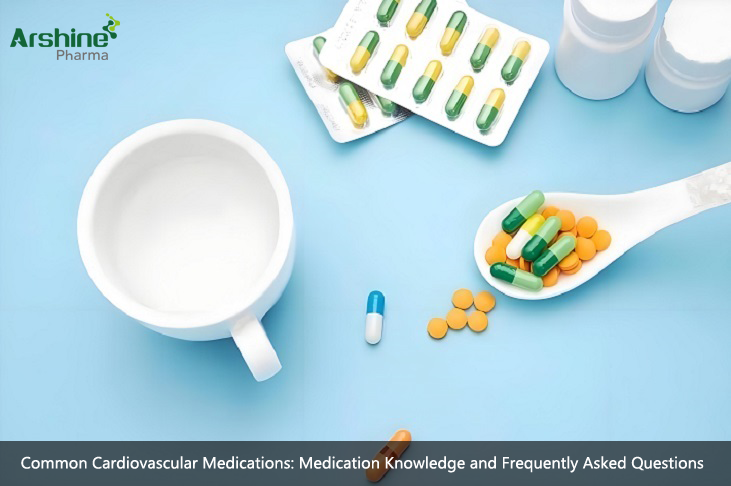
Antihypertensive Medications
First-line antihypertensive medications include five main classes: calcium channel blockers (CCB), angiotensin-converting enzyme inhibitors (ACEI), angiotensin receptor blockers (ARB), beta-blockers (BB), and diuretics.
Calcium channel blockers mainly consist of the "dipine" class, which includes dihydropyridine calcium channel blockers. There are also non-dihydropyridine options, such as verapamil and diltiazem. For example, amlodipine is effective regardless of the brand, as long as blood pressure is well-controlled. Even without amlodipine, similar medications like nifedipine, lacidipine, felodipine, benidipine, and nitrendipine are available.
Many patients with long-term hypertension often switch between community hospitals and comprehensive hospitals in search of a specific medication, brand, or manufacturer. This is unnecessary. In terms of effectiveness, no single antihypertensive medication is significantly superior. Most hypertensive patients benefit from using whatever is suitable for them.
For patients with chronic kidney disease, proteinuria, diabetes, metabolic syndrome (e.g., obesity), chronic heart failure, and those requiring secondary prevention of coronary artery disease, ACE inhibitors should be the first choice, with options like captopril belonging to this category, or ARBs, such as valsartan.
Although some international guidelines do not classify beta-blockers as first-line antihypertensive medications, they remain the primary or preferred option for patients with chronic heart failure, coronary artery disease, or rapid arrhythmias.
As a first-line antihypertensive, diuretics are commonly used in Europe and North America and are often the first choice due to their efficacy in reducing cardiovascular events. They are especially suitable for patients with edema or heart failure.
Diuretics are essential as they enhance the effectiveness of ACEI or ARB medications while mitigating side effects. If you haven't used diuretics, you cannot claim someone has resistant or difficult-to-treat hypertension.
Medications for Relieving Angina
Medications for relieving angina include beta-blockers like metoprolol and bisoprolol, nitrate esters such as nitroglycerin, isosorbide dinitrate, and isosorbide mononitrate. In some cases, calcium channel blockers are the primary or preferred medications for alleviating myocardial ischemia and angina, especially in cases of coronary artery spasm.
Nitroglycerin, often taken sublingually, is the fastest and most effective medication for relieving angina. It is available in sublingual tablets, sprays, injections, and patches; however, the spray may not be more effective than the tablets. Despite its widespread use, there is no definitive evidence that any nitrate ester, including nitroglycerin, can reliably save lives or reduce mortality risk.
Beta-blockers not only relieve myocardial ischemia and angina but also prevent ventricular tachycardia and sudden cardiac death due to ischemia, as well as post-myocardial infarction heart failure and reinfarction. However, beta-blockers should be used under medical guidance, as patients may struggle to self-manage their dosages.
Nitrate esters are not lifesaving medications and cannot revive the heart; intervention to open blocked coronary arteries is necessary to preserve myocardial function and life, and it should be done as soon as possible.
Lipid-Lowering Medications
Statins are both lipid-regulating drugs that effectively lower low-density lipoprotein cholesterol (LDL-C) and primary medications for atherosclerosis. They can prevent and inhibit plaque formation and development, stabilize plaques, and prevent plaque rupture that could lead to myocardial infarction or stroke.
Thus, even if lipid levels are not high, patients with atherosclerotic cardiovascular disease (ASCVD), such as coronary artery disease, cerebrovascular disease, and peripheral vascular disease, or those who have experienced vascular events (like myocardial infarction or stroke), should routinely use statins. For high-risk patients with existing atherosclerotic plaques, statins should also be routinely administered, regardless of lipid levels.
The main differences among statins lie in their ability to lower LDL-C. Atorvastatin and rosuvastatin are the most effective. The choice of statin depends primarily on the patient’s risk level and baseline lipid levels (mainly LDL-C).
For very high-risk patients, such as those who have already experienced cardiovascular events or are genetically predisposed to high cholesterol, LDL-C should be reduced to less than 1.8 mmol/L (70 mg/dL) or by at least 50%.
If a statin alone cannot achieve this goal, a cholesterol absorption inhibitor like ezetimibe should be added. If lipid levels still do not meet targets, the next option is a PCSK9 inhibitor, a monoclonal antibody that effectively lowers LDL-C and can be administered monthly via injection.
In addition to cholesterol, triglycerides are another important lipid component. Medications for lowering triglycerides primarily include fibrates, such as fenofibrate.
Aspirin
For patients with established cardiovascular disease or who have experienced vascular events, aspirin should be routinely used for secondary prevention; those who cannot tolerate it may use clopidogrel instead. For high-risk patients at risk for cardiovascular events, aspirin should also be administered for primary prevention. For high-risk patients with indications, aspirin can help prevent cardiovascular events.
Statins prevent plaque rupture, while aspirin prevents thrombosis following rupture, working together to reduce the risk of cardiovascular events and vascular mortality.
Aspirin acts at the moment of plaque rupture, helping to prevent thrombosis, which reduces the likelihood of myocardial infarction or stroke.
Concerns about statins causing liver and kidney damage are often exaggerated and misinterpret potential side effects. To date, I have not encountered any cases where statin use resulted in liver damage leading to death.
Oral Anticoagulants
Oral anticoagulants primarily include two classes: vitamin K antagonists like warfarin, and newer oral anticoagulants, including factor Xa inhibitors (like rivaroxaban) and factor IIa inhibitors (like dabigatran).
The main indications for oral anticoagulants include non-valvular atrial fibrillation, valvular heart disease, and valve replacement patients to prevent thrombosis; and for the prevention and treatment of venous thromboembolism.
Newer oral anticoagulants are less affected by genetic factors, food, and other medications, are convenient, have a rapid onset of action, and result in fewer intracranial bleeding incidents. They do not require routine monitoring of coagulation parameters or dose adjustments. However, for patients with valvular heart disease, severe renal insufficiency, or those on dialysis, warfarin remains the only available oral anticoagulant option.
